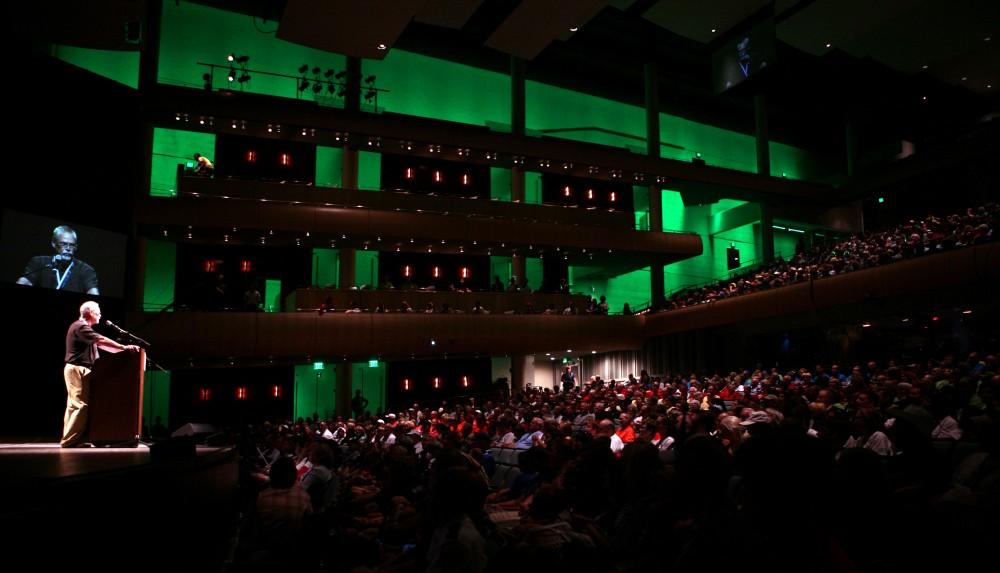Transplant Games of America’s legacy lives on

Bill Ryan, chairman and master of ceremonies for the 2012 Transplant Games of America, bids a fond farewell to this year’s games at the Transplant Games’ closing ceremonies held at DeVos Performance Hall on July 30.
Aug 1, 2012
Clad in hues of every color, athletes and their families packed Grand Rapids’ DeVos Performance Hall for the 2012 Transplant Games of America closing ceremonies, a multi-event five-day festival that highlights athletes who have undergone life-saving transplant surgeries and living donors, offering up the chance for these athletes to compete in a variety of different sporting events largely held on Grand Valley State University’s Allendale Campus.
“This is an exciting time,” said Bill Ryan, local sports marketing executive and chairman of the 2012 Transplant Games of America, who, in conjunction with the West Michigan Sports Commission, 700 volunteers and sponsorships from Spectrum Health and Saint Mary’s Health Care made the event possible.
Though the National Kidney Foundation cited economic hardship as their reason for cancelling the event last year, Hudsonville resident and kidney transplant recipient T.J. Mackiak revived a local effort last August to reorganize the games in Grand Rapids.
Nearly 1,000 athletes, 1,500 donor families, 700 volunteers also helped to make this years’ games an encouraging reality – an event that estimates a local economic impact that could inch as high at $2 million.
“Wow. I don’t know what else you can say after you’ve been a part of this the last five days,” Richard R. Smith, head of sales at Novartis who helped to organize this year’s games, told attendees at the closing ceremonies. “…To the organ recipients, you are personifying what it means to have a second chance at life by your participation in these games, and it’s what motivates me and my team.”
In a community with no shortage of sincerity and good will, standing ovations abound for everyone from team managers and honored participants – with an undertone of unbridled positivity for their success and for the return of the bigger and better Transplant Games of America in 2014, developments about which Ryan said would be posted on the organization’s website as they happen.
“As me and my team sat with Bill and Mike Guswiler that morning of the opening ceremonies, we talked about the future,” Smith said. “I can tell you that these guys and their teams are pioneers and they will take these games to new levels. I know we’ve acknowledged these guys a lot, but I want to acknowledge them for what they’ve done this week and the way they’ve done it – with character and class.”
Team Utah-Idaho took home the trophy for the top-scoring team of the 2012 Transplant Games, with Mississippi taking second, and team California taking third. The 2012 Female Athlete of the Year was Team Arizona’s Diane Miller, a liver transplant recipient who took home six gold, four individual and two relay medals at this year’s event. 75-year-old heart transplant recipient, Don Enhot of Team Philly, was named the top male athlete.
The ceremonies came to a close with a performance by local musician Hunter Brooks, whose song titled “Hunter’s Song,” went out to all of the transplant recipients, donors and survivors in the crowd.
“Thank you for coming and supporting the games,” Ryan told the crowd in his final farewell. “Thank you for believing that it can be done and thank you for always believing that in every life, great things are always possible.”





















